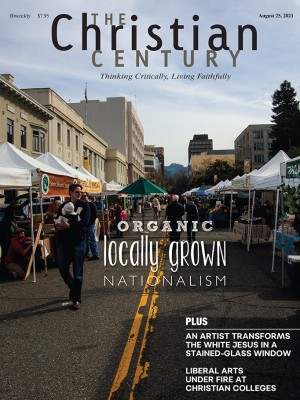Vatican trial opens into financial scandal

A cardinal who allegedly induced an underling to lie to prosecutors. Brokers and lawyers who pulled a fast one over the Vatican’s no. 2 to get him to approve a disastrous real estate deal. A self-styled intelligence analyst who bought Prada and Louis Vuitton items with the Vatican money that she was supposed to send to rebels holding a Catholic nun hostage.
Vatican prosecutors have alleged a jaw-dropping series of scandals in the biggest criminal trial in the Vatican’s modern history, which opened July 27. The once-powerful cardinal and nine other people are accused of bleeding the Holy See of tens of millions of dollars in donations through bad investments, deals with shady money managers, and apparent favors to friends and family.
Read our latest issue or browse back issues.
They face prison sentences, fines, or both if convicted.
The trial is the culmination of a two-year investigation into the Holy See’s flawed 350 million euro London real estate venture. The prosecutors also suggest that Pope Francis and his top lieutenants were not only aware of some of the key transactions, but in some cases explicitly authorized them, even without full documentation or understanding the details.
One Vatican monsignor who until recently was considered by prosecutors to be a key suspect, Alberto Perlasca, managed to avoid indictment. Perlasca’s office handled the London investment from start to finish and his boss had identified him as the main in-house culprit in obscuring the deal’s costly outcome. But prosecutors suggested that Perlasca flipped and became an important witness, in part after being pressured to recant his testimony by the lone cardinal on trial, Angelo Becciu.
Becciu, who is charged with embezzlement and with pressuring Perlasca to recant, has denied any wrongdoing.
The onetime chief of staff in the Vatican Secretariat of State, Becciu is linked to a mysterious figure who is also on trial, Cecilia Marogna, whom he hired in 2016 as an external security consultant.
Prosecutors allege that Marogna embezzled 575,000 euros in Vatican funds that Becciu had authorized for ransoms to free Catholic hostages. Bank records from her Slovenian front company show that the Vatican wire transfers were used instead to pay bills at luxury shops and boutique hotels. Marogna says the money was legitimate compensation and reimbursement for her intelligence-related expenses.
The London real estate deal dates to 2014, when the Secretariat of State decided to invest an initial 200 million euros in a fund operated by Italian businessman Raffaele Mincione, with half the money put into the London building and half in other investments.
By November 2018, the original investment had lost 18 million euros, prosecutors say, prompting the Vatican to seek an exit strategy while retaining its stake in the building in London’s swank Chelsea neighborhood.
Enter Gianluigi Torzi, another broker, who helped arrange a 40 million euro payout to Mincione.
But prosecutors say Torzi then hoodwinked the Holy See by secretly restructuring 1,000 shares in the property’s new holding company in a way that gave him full voting rights. Prosecutors say Torzi then extorted the Vatican for 15 million euros to get control of the building that it thought it had already acquired.
Mincione and Torzi, who are accused of fraud, money laundering, embezzlement, and other charges, have denied wrongdoing.
The payout of 15 million euros to Torzi is at the heart of the case. Prosecutors accuse Torzi of extorting the Vatican for the money and the Vatican’s financial oversight agency of failing to stop the deal. The oversight managers say the Vatican had no choice but to pay Torzi, since the Secretariat of State—knowingly or not—signed legally binding contracts that gave Torzi control of the building.
Prosecutors say the Secretary of State, Cardinal Pietro Parolin, was deceived into approving Torzi’s contract by a lawyer who drafted a one-page memo describing the deal but omitting key details, including Torzi’s voting stake. Becciu’s successor as chief of staff, Archbishop Edgar Peña Parra, said only later did the Vatican realize the lawyer was associated with Torzi.
Quoting Parolin’s own notes, Peña Parra said the cardinal approved the deal based on the lawyer’s brief memo and assurances from Perlasca and another Vatican money manager, Fabrizio Tirabassi.
Parolin, Peña Parra, and Perlasca were not charged. Tirabassi is charged with corruption, extortion, embezzlement, fraud, and abuse of office. He denies wrongdoing. —Associated Press






